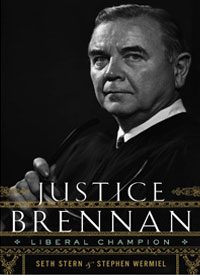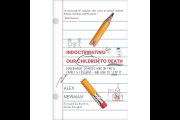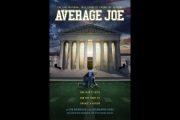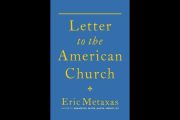
Justice Brennan: Liberal Champion, by Seth Stern and Stephen Wermiel, Boston: Houghton Mifflin Harcourt, 2010, 547 pages, hardcover. On April 18, 1906, a devastating earthquake struck the San Francisco Bay area, sending shockwaves from southern Oregon to points south of Los Angeles. Exactly one week later, on the other side of the continent, William Joseph Brennan, Jr. was born. Judicial conservatives might well consider Brennan the greater disaster.
For as the subtitle of the book Justice Brennan declares, the Newark native was a “Liberal Champion,” though that was not the general expectation when Republican President Dwight Eisenhower appointed him to the Supreme Court in 1956. “Little in his career as a corporate lawyer and New Jersey state judge suggested that William Brennan would emerge as perhaps the most influential justice of entire twentieth century,” authors Seth Stern and Stephen Wermiel wrote in the prologue to their interesting and highly readable biography. “No one could have predicted that Brennan would become the most forceful and effective liberal ever to serve on the court.”
Through much of his 34-year tenure on the court, few were aware of the pivotal role Brennan played. A 1966 cover story on “The Warren Court” in the New York Times magazine made no mention of Brennan. And, the biographers note, Brennan’s presence at a meeting of the Pennsylvania Bar Association in 1960 was overshadowed by actor Raymond Burr, who was not a lawyer though he played one on television. TV’s “Perry Mason” obligingly signed autographs, while “Mr. Justice Brennan came unheralded,” the Pittsburgh Post Gazette noted. “He left unfollowed.”
Two years later Brennan wrote one of the many controversial opinions of the Warren Court in Baker v. Carr, requiring the states to alter the drawing of electoral districts to ensure equal representation by population. He would author other unsettling opinions during his decades-long tenure on the court, but his enormous influence, Stern and Wermiel point out, came primarily from his skills as a “keen workplace politician,” smoothing out differences among conflicting legal opinions and effecting compromises that ultimately reflected his own thinking on social and political questions that remain “hot button” issues today. Court rulings on abortion, affirmative action, civil rights, and the death penalty, whether penned by Brennan or other members of the court’s liberal bloc, have Brennan’s fingerprints on them and the force of his intellect behind them.
And that seemingly modest, unassuming man quietly made some remarkably bold statements in support of his expansive view of the court’s interpretive powers. In 1958, Brennan authored the opinion of the court in Cooper v. Aaron, denying a request from the Little Rock, Arkansas, school district for a delay in implementing the court’s desegregation order. All legislative, executive, and judicial officers are “solemnly bound not to war against the Constitution,” he wrote, and to “obey its commands as defined by this Court.” In language that was sure to raise eyebrows and not a few hackles, Brennan stated matter-of-factly that the findings of the court are the “supreme law of the land.” Chief Justice Earl Warren, another remarkably skilled “workplace politician,” got all the justices to sign the one opinion, which Warren read from the bench. Few outside of the court knew who wrote it.
The son of Irish immigrants, Brennan grew up under the influence of William, Sr., a prominent and much loved politician in Newark, who no doubt would have been amazed to read the opinion his son wrote for the court in Texas v. Johnson, declaring that flag burning as an act of protest is constitutionally protected speech. For the authors tell us that the elder Brennan, as City Commissioner in charge of public safety, “declared that any police officer who did nothing in the face of an insult to the American flag did not deserve to wear the uniform.”
Brennan, Sr. ran afoul of the law when he threatened to pull the license of Newark’s Capitol Theatre and arrest anyone involved in the showing of The Naked Truth, a film about the dangers of venereal disease. A state judge issued an injunction to stop him, however, stating Brennan had no authority to interfere. Years later the commissioner’s son, as a justice on the New Jersey Supreme Court, found another public safety director in Newark exercised unconstitutional prior restraint on speech by denying an operating license to a theater because it had previously held burlesque shows. In his written opinion, the younger Brennan cited the 1926 court decision that prevented his father from doing essentially the same thing.
At Harvard Law School, young Bill Brennan became a student of Professor Felix Frankfurter, with whom he would later serve on the Supreme Court. Though Brennan remained an admirer to the end, the influence of the older, more conservative jurist on his former pupil waned considerably during their time together on the court, as Brennan regularly joined with Warren, William Douglas and Hugo Black to form the court’s liberal bloc. Though ever in awe of Frankfurter, Brennan came to regard his approach to the law as the jurisprudence of a bygone era. “We would be inclined to agree with Felix more often,” he once said, “if he quoted (Oliver Wendell) Holmes less frequently to us.”
The authors include some charming anecdotes, including an account of the time Brennan and his son Bill, on an early morning walk with neither bearing any identification, were picked up on the grounds of a nearby prep school by a pair of police officers who suspected them of trying to break in. At Brennan’s request they brought them to his home, where his wife identified the unshaven, suspicious looking pair as her husband and son and confirmed that the elder of the two was indeed a judge on the Supreme Court. The genial judge then invited the embarrassed officers in and cooked breakfast for them.
Brennan’s concern for due process in criminal cases was evident during his tenure on the state Supreme Court in the 1950s. In one remarkable case, he wrote a vigorous dissent when the court ruled that a defendant in a murder trial was not entitled access to either his own statements to the police or the witnesses’ statements. “It shocks my sense of justice that in these circumstances counsel for an accused facing a possible death sentence should be denied inspection of his confession,” Brennan wrote.
In his public speeches, he expressed concern over congressional investigations he likened to “Salem witch hunts” and “inquisitions” that destroyed reputations of “hapless, helpless victims.” The thinly veiled references to Senator Joseph McCarthy’s investigations into subversive activities within the government did not go unnoticed by the Wisconsin Senator, who was given the opportunity to question the Supreme Court nominee at his confirmation hearing in 1957. McCarthy asked the judge if he could cite any instance of epithets hurled “at the hapless, helpless victims.”
“I can’t name any specific instances for you, Senator,” Brennan answered.
“Do you approve of congressional investigations and exposure of the Communist conspiracy setup?” McCarthy asked.
“Not only do I approve, Senator,” said Brennan, “but personally I cannot think of a more vital function of the Congress than the investigatory function of its committees, and I can’t think of a more important and vital objective of any committee investigation than that of rooting out subversives in government.”
Though five Catholics had preceded him on the high court, Brennan was required to make the ritual denial of dual loyalty that John F. Kennedy would later make as a Catholic running for President. “There is a certain irony,” the authors suggest, “that both Brennan and Kennedy, neither of whom considered themselves particularly religious, found it necessary to pledge to compartmentalize their private faith, when it was not likely to guide them anyway.”
In welcoming a challenge to a Connecticut law banning the use of contraceptives, Brennan worked quietly behind the scenes with Justice Douglas in formulating an undefined but overarching right to privacy the law violated. According to Stern and Wermiel, it was Brennan who later suggested to Douglas that the privacy right, which Douglas had located in “a penumbra reflecting emanations” from other rights spelled out in the Constitution, would be useful in striking down abortion laws as well. While Justice Harry Blackmun wrote the opinion of the court in the 1973 Roe v. Wade ruling, that decision, like so many others, bore the heavy imprint of Justice William J. Brennan.
A dozen years letter, Brennan publicly rebutted calls for a return to a “jurisprudence of original intention,” claiming it is “arrogance cloaked in humility” to presume to know what the Framers intended. Besides, he declared, the “genius of the Constitution rests not in any static meaning it might have had in a world that is dead and gone, but in the adaptability of its great principles to cope with current problems and current needs.”
While Brennan’s stand drew editorial praise from the New York Times and other “progressive” newspapers, Stuart Taylor, writing in the New Republic, questioned the role of judges as arbiters self-empowered to define our “current problems” and determine our “current needs.” Taylor saw “real problems with the freewheeling judicial activism sometimes practiced by people like Brennan. Among these is a tendency to ‘find’ in the Constitution rights (such as abortion rights) and social policies that can honestly be found neither in the language of the document, nor in the records left by those who wrote it, nor in any broad national consensus that has evolved since then.” Brennan had, for example, called the death penalty unconstitutional, though the Fifth and 14th Amendments acknowledge and accept its use, subject to “due process of law.” Brennan chose to impose his own “moral convictions” on constitutional law to negate the choices made by elected representatives, Taylor charged.
Brennan, of course, was not alone in that. But in the Roe case, especially, he is as much responsible as any of his colleagues for making the Constitution what the abolitionist Frederick Douglass called “a covenant with death and an agreement with hell.” Perhaps Justice Brennan, who died 14 years ago, now views that covenant in a different light.



